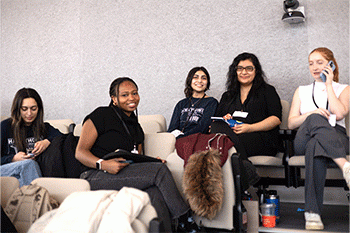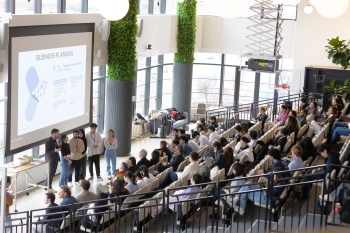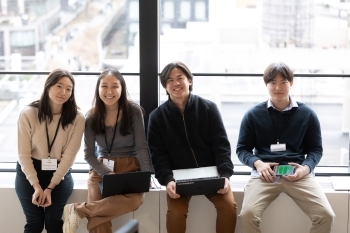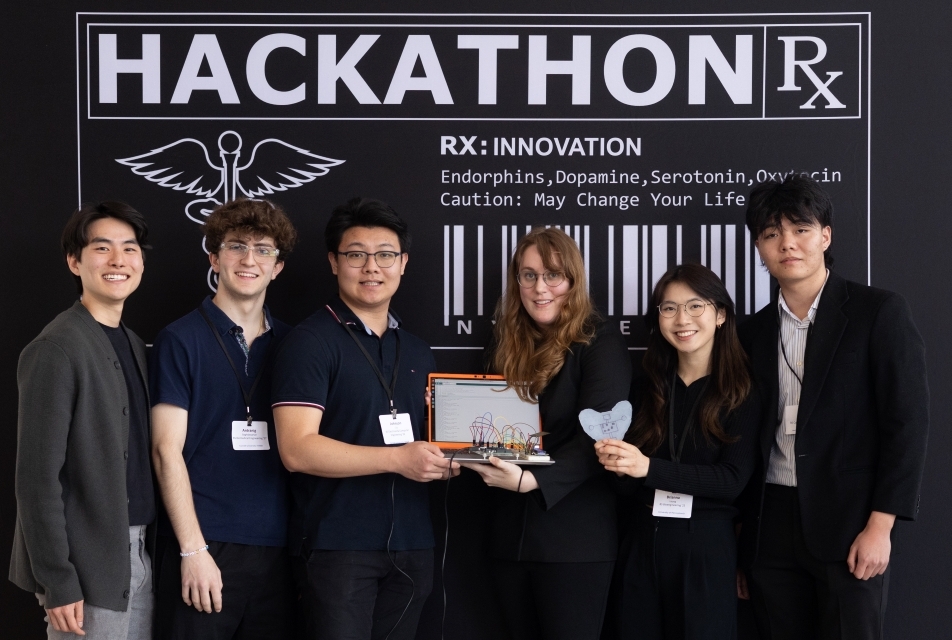The 2024 Health Hackathon brought together 185 students with diverse backgrounds from Cornell and 26 other universities—in just 36 hours, they addressed critical safety challenges facing patients today.
The competition, held in person from March 8-10 and organized by Weill Cornell Medicine’s Clinical & Translational Science Center (CTSC) and Entrepreneurship at Cornell, had multidisciplinary teams of future researchers, engineers, physicians, computer scientists and businessmen collaborating to tackle issues from partner violence to making a ultrasound imager portable.

Teams addressed patient safety challenges related to medication, patient care, procedures and surgery, infection and diagnostic errors. Credit: Ashley Jones
“A lot of what these student inventors are doing must be backed by scientific evidence, especially when it comes to health,” said My Linh H. Nguyen-Novotny, director of clinical research education at the Weill Cornell Medicine CTSC, who co-organized the event. “This is another way for them to implement their research ideas while learning new skills, like leadership, entrepreneurship and teamwork.”
Sponsors and supporters included Johnson & Johnson, Patient Safety Technology Challenge, Engaged Cornell, dCommunity, and Next Jump in Chelsea, which provided the venue with a view of the Hudson River.
To build the teams, participants presented their ideas during online sessions and those who were passionate about the same goal convened in person to transform their ideas into viable solutions. Over two days, they worked together with mentors—45 professionals who spent the weekend guiding the industrious students.
By the third day, it was showtime as they presented their solutions to peers, mentors and sponsors. Nine out of the 35 teams were selected for a competitive final round where each gave a four-minute presentation, followed by a four-minute Q&A session with the judge’s panel.

The students presented their solutions to peers, mentors and sponsors. Nine out of the 35 teams were selected for a competitive final round. Credit: Ashley Jones
Making a Difference in Health Care
This year’s $3,000 grand prize went to Team Current Care for developing a device that measures blood flow and uses pressure data to prevent pressure ulcers (bedsores) that plague bedbound patients. The team presented a physical prototype in the final round that delivered electrical stimulation which increased blood flow to affected body parts.
Members of the team included Johnson Liu ’26 and Antranig Baghdassarian ’27, Cornell Biomedical Engineering; Andrew Lee M.D. ’25, Weill Cornell Medical College; Leah Lackey Ph.D. ’28, Cornell Electrical and Computer Engineering; Brianna Leung ’25, Biomedical Engineering at the University of Pennsylvania; and Justin Liu ’27, Computer Science at Northeastern University.
Preventing pressure ulcers, painful skin lesions that complicate the care of hospitalized patients, could help more than 2.5 million people in the United States each year. When Leung pitched the project idea, she hoped others would be interested in joining her.
Baghdassarian recalled wanting to jump in right away. His teammates expressed similar enthusiasm, so they united their diverse skills to solve the urgent patient need.
"It was helpful having participants from different backgrounds because it made us really narrow down what each person was good at in the beginning,” said Lee.
As the team hashed out ideas, mentors with real-world experience provided feedback that kept them focused on their project goal. “We had ideas, but the mentors gave us a sanity check,” Lackey said.

At least a dozen companies have spun off from the Health Hackathon in its nine years. Credit: Ashley Jones
The other winning teams:
Most innovative ($2,500): Cedar, a wearable device which detects carotid artery issues to prevent stroke.
Best use of AI ($2,500): Team Rocket, a virtual assistant that helps home health care nurses respond to adverse medical events.
Most market ready ($1,500): Femnostics, a one-step medical test to diagnose vaginal health issues.
Most potential impact ($500): IP Vision, an AI software that detects intimate partner violence in an acute care setting.
“Here, the opposite of winning is not losing; it simply means that another team pitched their idea better or just performed in a better capacity, but each team accomplished their goal,” said Ami Stuart, director of hackathons for Entrepreneurship at Cornell, likening the participants to runners completing the New York City Marathon. “You did something very difficult, and you completed it this weekend.”
“These events make the imaginable real,” said Julianne Imperato-McGinley, associate dean and founding director of the CTSC. Given the right resources and mentors, it's possible for students to do amazing things that make a difference.

